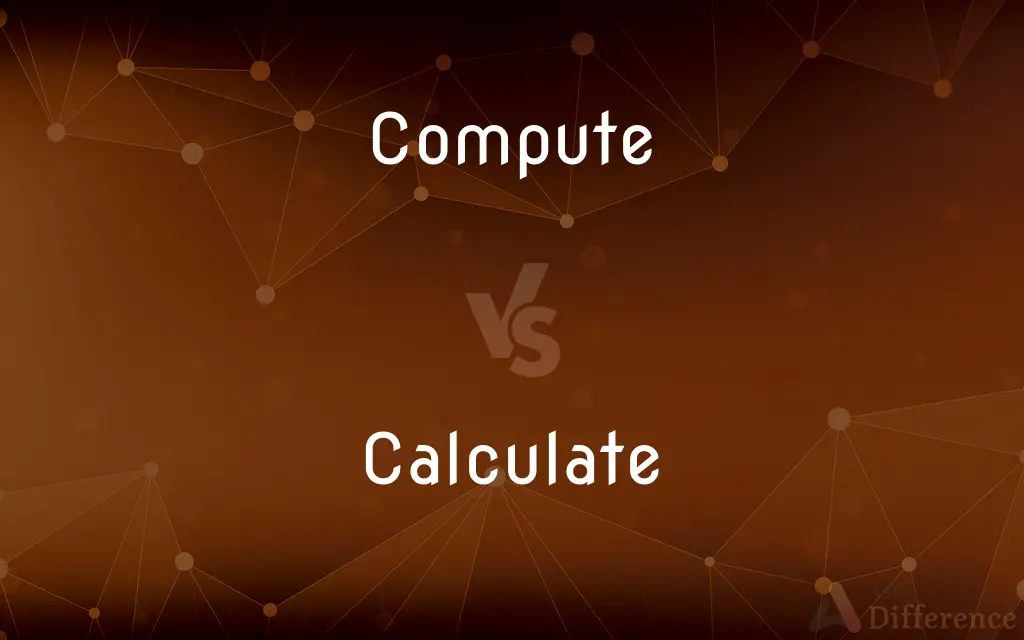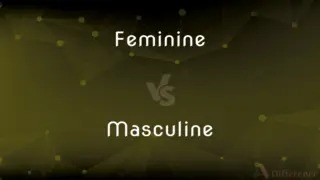Compute vs. Calculate — What's the Difference?
By Fiza Rafique & Urooj Arif — Updated on March 7, 2024
Compute involves processing data or performing mathematical operations, usually by a computer, while calculate refers to determining a result through mathematical operations, often manually or with a calculator.

Difference Between Compute and Calculate
Table of Contents
ADVERTISEMENT
Key Differences
Computing is generally associated with the operation of computers and involves not only performing arithmetic operations but also executing algorithms, processing data, and managing complex systems. In contrast, calculating is more closely related to the act of performing mathematical operations to find an answer or solve a problem.
While computing can encompass a wide array of operations beyond mere arithmetic, including data analysis, simulation, and running applications, calculating typically refers to numerical computation specifically. For instance, calculating the total cost of items in a shopping cart involves basic arithmetic, whereas computing can refer to the entire process carried out by an online shopping system, including inventory management, user interface interactions, and transaction processing.
In the realm of professional and academic disciplines, computing is a broader field that encompasses areas such as software development, system architecture, and network management. Calculation, on the other hand, is a fundamental skill used across various fields, including mathematics, engineering, finance, and science, for problem-solving and analysis.
The evolution of technology has blurred the lines between computing and calculating, with advanced calculators and software capable of handling complex mathematical functions and algorithms that were once possible only on computers. However, the distinction remains in the scale and scope of operations, with computing covering a broader, more integrated range of processes and calculations focusing more narrowly on mathematical operations.
Comparison Chart
Definition
Processing data or performing operations, typically using a computer.
Determining a result through mathematical operations, often manually.
ADVERTISEMENT
Scope
Broad, can involve complex systems and algorithms.
Narrower, focused on numerical and arithmetic operations.
Associated With
Computer science, information technology.
Basic arithmetic, mathematics.
Operations
Data analysis, simulations, applications.
Addition, subtraction, multiplication, division.
Context
Digital processing systems, software development.
Manual problem-solving, using a calculator.
Compare with Definitions
Compute
Refers to the operation of computers and digital systems.
Modern smartphones can compute complex algorithms quickly and efficiently.
Calculate
Performing mathematical operations to find a result, often manually.
She used a calculator to calculate the total cost of her groceries.
Compute
Involves processing data, running applications, and executing algorithms.
The server is configured to compute large data sets for scientific research.
Calculate
Focused on numerical and arithmetic computations.
To calculate the area of a circle, you need to multiply the square of the radius by π.
Compute
Used in contexts related to software development and information technology.
Her job in computing involves developing software for data analytics.
Calculate
Often involves the use of basic calculators or mental arithmetic.
Students learn to calculate simple equations in their heads before using calculators.
Compute
Can encompass a wide array of digital processes beyond arithmetic.
The gaming console computes graphics and physics simulations in real time.
Calculate
Necessary for everyday tasks, from budgeting to cooking.
Calculating the right amount of ingredients is crucial for a successful recipe.
Compute
Integral to fields like computer science and digital engineering.
He specializes in quantum computing, focusing on leveraging quantum mechanics to process information.
Calculate
A fundamental skill in mathematics and various scientific disciplines.
Calculating probabilities is essential in statistics and data analysis.
Compute
To determine by mathematics, especially by numerical methods
Computed the tax due.
Calculate
To ascertain by computation; reckon
Calculating the area of a circle.
Calculated their probable time of arrival.
Compute
To determine by the use of a computer.
Calculate
To make an estimate of; evaluate
Calculating the team's chances of winning.
Compute
To determine an amount or number.
Calculate
To make for a deliberate purpose; design
A sturdy car that is calculated to last for years.
A choice that was calculated to please.
Compute
To use a computer.
Calculate
To suppose
"I cal'late she's a right smart cook" (Dialect Notes).
Compute
To be reasonable, plausible, or consistent; make sense
Your alibi doesn't compute.
Calculate
To plan, intend, or depend on.
Compute
Computation
Amounts beyond compute.
Calculate
To perform a mathematical process; figure
We must measure and calculate to determine how much paint will be needed.
Compute
(transitive) To reckon, calculate.
Can anyone here compute the square root of 10201?
Calculate
To suppose; guess.
Compute
To make sense. commonly used in mimicry of a science fictional robot and spoken in a robotic voice; most frequently in negative constructs
Does that compute, or do I need to explain further?
Calculate
To count, depend, or rely on someone or something
We're calculating on your help.
Compute
Computational processing power
Calculate
To determine the value of something or the solution to something by a mathematical process.
Calculate the square root of 3 to 10 decimal places.
Compute
To determine by calculation; to reckon; to count.
Two days, as we compute the days of heaven.
What's done we partly may compute,But know not what's resisted.
Calculate
To determine values or solutions by a mathematical process; reckon.
Compute
Computation.
Calculate
To plan; to expect; to think.
Compute
Make a mathematical calculation or computation
Calculate
To ascertain or predict by mathematical or astrological computations the time, circumstances, or other conditions of; to forecast or compute the character or consequences of.
To calculate or cast one's nativity
Calculate
To adjust for purpose; to adapt by forethought or calculation; to fit or prepare by the adaptation of means to an end.
To calculate a system of laws for the government and protection of a free people
Calculate
(chess) To imagine sequences of potential moves and responses without actually moving the pieces.
Calculate
To ascertain or determine by mathematical processes, usually by the ordinary rules of arithmetic; to reckon up; to estimate; to compute.
A calencar exacity calculated than any othe.
Calculate
To ascertain or predict by mathematical or astrological computations the time, circumstances, or other conditions of; to forecast or compute the character or consequences of; as, to calculate or cast one's nativity.
A cunning man did calculate my birth.
Calculate
To adjust for purpose; to adapt by forethought or calculation; to fit or prepare by the adaptation of means to an end; as, to calculate a system of laws for the government and protection of a free people.
[Religion] is . . . calculated for our benefit.
Calculate
To plan; to expect; to think.
Calculate
To make a calculation; to forecast consequences; to estimate; to compute.
The strong passions, whether good or bad, never calculate.
Calculate
Make a mathematical calculation or computation
Calculate
Judge to be probable
Calculate
Keep an account of
Calculate
Predict in advance
Calculate
Specifically design a product, event, or activity for a certain public
Calculate
Have faith or confidence in;
You can count on me to help you any time
Look to your friends for support
You can bet on that!
Depend on your family in times of crisis
Common Curiosities
Can a calculator be used for computing?
Yes, calculators can be used for computing in the sense that they process data and perform mathematical operations, though they are typically associated with basic calculations.
Is computing only related to mathematics?
While computing involves mathematical foundations, it extends to various applications, including software development, system management, and data analysis, which may not be purely mathematical.
Do you need a computer to compute something?
Traditionally, computing implies the use of computers or digital systems, but conceptually, it can also refer to any systematic method of processing information, including human mental processes.
Why is the distinction between computing and calculating important?
Understanding the distinction is important in educational, professional, and technical contexts to clarify the scale, scope, and nature of the tasks or operations being referred to.
How has the evolution of technology affected the way we calculate and compute?
Technology has made powerful computing capabilities more accessible and integrated into everyday devices, allowing for more complex calculations and data processing in various fields.
How do professionals in fields like engineering use computing and calculating differently?
Engineers may calculate for specific design parameters and numerical analysis, while computing is used for simulations, modeling, and integrating systems within engineering projects.
What educational paths focus on computing and calculating?
Computing is central to computer science and IT degrees, while calculating is emphasized in mathematics, engineering, and physical sciences education.
How do advanced calculators blur the line between computing and calculating?
Advanced calculators capable of handling complex functions, programming, and graphing extend beyond simple arithmetic, thus performing tasks traditionally associated with computing.
What role do algorithms play in computing?
Algorithms are central to computing, providing the step-by-step instructions for processing data, solving problems, and executing tasks within software and digital systems.
How does artificial intelligence relate to computing and calculating?
AI involves complex computing processes, including learning algorithms and data analysis, to perform tasks that might include calculation but extend to pattern recognition, decision-making, and more.
Can computing involve manual processes, or is it always digital?
Computing is predominantly digital, especially in modern contexts, but the principles of computing can be applied to manual processes, such as using systematic procedures to solve problems.
Is there a difference in skill sets required for computing vs. calculating?
Yes, computing often requires knowledge of programming, system architecture, and software applications, whereas calculating generally involves mathematical and arithmetic proficiency.
Can animals compute or calculate in any way?
Some animals demonstrate basic problem-solving abilities that could be considered a form of calculation, but they do not compute in the human or digital sense.
What are some everyday examples of computing beyond traditional calculations?
Everyday computing examples include smartphone apps, GPS navigation, online banking transactions, and smart home devices, which process complex data beyond simple arithmetic.
What advancements in computing have significantly impacted society?
Advancements such as the internet, mobile computing, artificial intelligence, and blockchain have transformed communication, business, and social interactions.
Share Your Discovery

Previous Comparison
Binocular vs. Biocular
Next Comparison
Feminine vs. MasculineAuthor Spotlight
Written by
Fiza RafiqueFiza Rafique is a skilled content writer at AskDifference.com, where she meticulously refines and enhances written pieces. Drawing from her vast editorial expertise, Fiza ensures clarity, accuracy, and precision in every article. Passionate about language, she continually seeks to elevate the quality of content for readers worldwide.
Co-written by
Urooj ArifUrooj is a skilled content writer at Ask Difference, known for her exceptional ability to simplify complex topics into engaging and informative content. With a passion for research and a flair for clear, concise writing, she consistently delivers articles that resonate with our diverse audience.
















































